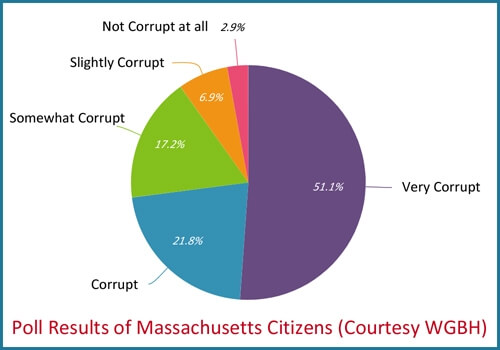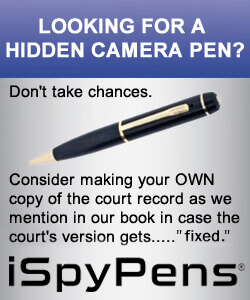Corruption in the Massachusetts Courts

The above poll was taken earlier this year. Citizens of Massachusetts were surveyed and responded according to the amount of corruption they felt existed in their state. Our national network of victims of corruption in the legal system encompasses people from many different states. No states are immune—all have some level of corruption in their legal systems, but it seems that Ohio, Washington, and the People’s Republic of Massachusetts are top contenders for the gold medal. The following is a portion of an actual petition for interlocutory relief I filed in the Massachusetts Supreme Court, which was denied by its judge-criminals. The named attorney, Joseph L. Michaud, also a criminal, belongs in prison but is not incarcerated because of his political connections.
LEGAL DISCUSSION
The convoluted court record, however, shows that on September 15, 2014, the judgment was vacated as “issued in error” (see appendix B). The reason for this entry is that Michaud called the court crying because he messed up by not filing a timely answer and counterclaim, and it was vacated as a favor to him over the phone. Petitioner has provided ample proof of this. One piece of indisputable evidence is the email he received from the court on September 8, 2014, saying the judgment was vacated (See exhibit I in appendix of Petitioner’s brief to the appellate court). However, the court first officially mentions its “error” (really a non-existent error) on the docket on September 15, 2014, coincidentally several days AFTER Michaud filed his motion to vacate judgment on September 9, 2014—which was a day LATER than the email received from the court—and PRIOR to any hearing for the motion! Although there is no entry on the docket for such motion being heard on October 29, 2014, there is a paradoxical ruling by Kevan J. Cunningham on November 09, 2014, allowing the motion to vacate an already vacated judgment, for at least the third time, maybe to ensure it wouldn’t somehow unvacate itself.
On September 10, 2014, petitioner received an additional email from the court clerk:
“Based upon our file, your motion for default judgement [sic] must be heard and allowed by a Judge. Therefore, since the judgement [sic] was entered in error it has been vacated. The Defendant has also filed a Motion to Dismiss, Motion to Vacate Default Judgement [sic], and Opposition to Plaintiff's Motion for Default Judgement [sic]. All 4 motions will be heard at the same time on 10-29-14.”
The implication of any error in entry is incorrect since civil procedure rule 55(b)(1) clearly states:
“(b) Judgment. Judgment by default may be entered as follows:
(1) By the Clerk. When the plaintiff's claim against a defendant is for a sum certain or for a sum which can by computation be made certain, the clerk upon request of the plaintiff and upon affidavit of the amount due and affidavit that the defendant is not an infant or incompetent person or an incapacitated person as defined in G.L. c.190B, shall enter judgment for that amount and costs against the defendant, if he has been defaulted for failure to appear.”
The motion for default judgment was filed under this rule. Although the district court had stated in the above email that the default entry was in error, it was not. All requirements of the case were met perfectly according to rule 55(a) and (b)(1). Now, if rules 55(c), 60(a), and 60(b) are all studied carefully, it can be seen that the only way an error-free default judgment can be vacated is by motion under 60(b). The emails by court personnel and the confusing court record are all likely part of a smokescreen to cover up a call by Michaud to the court on or about September 8, 2014, in order to get the judgment orally and illegally vacated. This is nothing less than conspiracy to commit fraud. At a time beginning shortly thereafter, the court then tried to cover its tracks with multiple docket entries to conceal the political favor.
Besides the evidence provided on page three of this petition, the petitioner knows this call was made because a package from Michaud was delivered by U.S. mail not long after September 8, 2014, to the mailing address the petitioner gave to the clerk by email on August 28, 2014. The only way Michaud could have possibly known of this address is via contact with the court since this is not the residential address of the petitioner. It may not be against court rules of procedure to contrive the court record and perform political favors or against rules of professional conduct for a lawyer to ask for them, but it certainly violates the petitioner’s right of due process under the Fourteenth Amendment.
The high court has ruled in Commonwealth v. Bertini “We therefore allow interlocutory review under G.L. c. 211, § 3, only where ‘there are substantial claims alleging violation of the appellant's substantive rights,’ and the error complained of is ‘irremediable so that an order for a new trial in the normal process of appeal will not put the defendant in statu quo’” quoting Beckman v. Commonwealth (emphasis added). Obviously, violating court rules of procedure and statutory law rise to the level of, if not eclipse, “violation of the appellant’s substantive rights.” Denying the petitioner’s rights of due process under the Fourteenth Amendment and possibly denying other civil rights as well in the case likewise and quite easily exceed this standard.
Defendant filed a (fraudulent) answer and counterclaim in the case nearly nine years late. This was done in violation of Civil Procedure Rule 12(a)(1). The court has not only refused to take remedial action, it has chosen to ignore this fact.
Michaud has committed at least three state felonies in this case: obstruction of justice, in violation of General Law Chapter 268 § 13B(1); perjury, in violation of General Law Chapter 268 § 1; and conspiracy to commit fraud and has violated 18 U.S. Code § 241 and § 1623(a). These acts have all been clearly elaborated in Petitioner’s brief to the appellate court (See pages 27 to 39). The court has not only refused to take remedial action, it has chosen to ignore the existence of these crimes.
Petitioner was denied a jury trial, a right provided under the U.S. Constitution. He has repeatedly stated this fact (See pages 93 and 94 and exhibit E2 in appendix of Petitioner’s brief to the appellate court). Since the court gave no indication to either party who contacted it prior to trial that it would not reschedule the trial, Petitioner did not expect a judgment to issue. What was expected is some form of communication from the court indicating a new trial date. By not allowing a continuance with good cause, Civil Procedure Rule 40(b) has been violated. The court has not only refused to take remedial action, it has chosen to ignore this fact.
The court has on many occasions failed to notify Petitioner of court events and rulings according to Civil Procedure Rule 77(d), such as the above judgment being issued on November 3, 2015. Furthermore, the court has instructed Petitioner not to contact it. This is an egregious violation of his right to due process under the Fourteenth Amendment to the U.S. Constitution (See exhibit E in appendix of Petitioner’s brief to the appellate court). The court has not only refused to take remedial action, it has chosen to ignore these facts.
Appellate Procedure Rule 4(a) states that a notice of appeal sent to the appellate division will be deemed filed with the trial court on the date the appellate division receives it. The appellate court conveniently leaves out in its rescript that Petitioner filed his notice with the appellate division in December of 2015, not January of 2016. The court has chosen to ignore this fact.
Because many judges have ruled in the case without regard to rules of procedure, statutory law, or the U.S. Constitution, Judicial Canon 1, Rule 1.1; Canon 2, Rule 2.4 (A); Canon 2, Rule 2.4 (B); and Canon 2, Rule 2.9 A(3)(a) have been violated. The court has not only refused to take remedial action, it has chosen to ignore this fact.
Since judges have decided not to investigate the criminal acts of Michaud and court officials involved in the case, those judges have committed misprision of a felony according to 18 U.S. Code § 4. The court has not only refused to take remedial action, it has chosen to ignore this fact.
The court record was manipulated to show that the original default judgment was vacated after the motion to vacate was filed by the defendant, and the entry of November 9, 2014, further attempts to hide this crime and the conspiracy behind it. As such, 18 U.S. Code § 1506 has been violated. The court has not only refused to take remedial action, it has chosen to ignore this fact.
This court must know that other courts have ruled that a litigant cannot benefit by his own misdeeds or illegal acts. “’[Equitable estoppel] is wholly independent of the limitations period itself and takes its life from the equitable principle that no man [may] profit from his own wrongdoing in a court of justice.’ (Battuello, supra, 64 Cal.App.4th 842, 847-848, 75 Cal.Rptr.2d 548, quoting Bomba v. W.L. Belvidere, Inc. (7th Cir.1978) 579 F.2d 1067, 1070.)” (Emphasis strongly added.) See Lantzy v. Centex Homes, 73 P. 3d 517 (2003) Cal Supreme Court and many others. Michaud has profited several times from his own wrongdoing and criminal acts.
CONCLUSION
To summarize, the courts have effectively wrapped dozens of errors and criminal acts inside an outer shell composed of the notion of an “untimely” notice for the filing of the original appeal. They are all effectively saying, “We’re going to ignore every single fact you are presenting and continue to hide all the crimes that have been committed because we’re not going to let you get through the tough outer shell even though there is ample case law that you’ve provided allowing for it—simply because we choose to do this.” The courts have been biased with their rulings because Petitioner has justifiably filed complaints with the CJC, BBO, FBI, DoJ, and many other organizations. The courts’ message is basically, “Let’s break the rules to lock Petitioner out of the house, and then once he’s locked out, follow the rules so that he can’t get back in, and if that doesn’t work, break the rules to ensure it doesn’t happen.” This is disturbing. The only reason Petitioner is not winning the case is because the system doesn’t want him to win; it has nothing to do with logic, law, or justice.
The case all boils down to Petitioner doing a significant amount of off-site consulting work, and then not only does Defendant refuse to pay, but the court illegally rips $11,271.53 out of Petitioner’s hands while allowing several people to commit multiple crimes. Add to this, Defendant puts Petitioner’s company, BR Enterprises, out of business, and then for stealing at least $5,000 from him through a suspended attorney, what does the legal system do about all of this? It “rewards” Petitioner by saying he needs to pay Defendant $32,913.30, which just by chance happens to be very close to the original amount of Petitioner’s claim. This is 100% completely outrageous! No judge in any court has yet to lift a toxic finger to remedy the extreme injustices in the case, which could very well be the poster child/case for the grossest miscarriage of justice in that state this century. The petitioner requests this high court to mandate that the respondents remedy their violation of court rules of procedure and statutory law and that this court hears the case on its true merits. The petitioner demands the high court investigate the misdeeds and criminal acts of Michaud and others involved and punish them accordingly!
Someone has to finally step forward, take responsibility, and uphold justice, regardless if it implicates personnel in lower courts or anyone else for that matter. In a best-case scenario to uphold justice, this court will vacate the current fraudulent judgment and reinstate the original correct judgment. In a worst-case scenario to uphold justice, Petitioner will be allowed a jury trial (preferably in a non-corrupt court, if one exists in that state) at the very least. Remember that judges are paid to do a job based on rules and law, not to render decisions that ignore facts just to protect their friends, colleagues, or others!!! From the foregoing facts, it is clear the respondents have violated the rules of procedure, statutory law, the civil rights of Petitioner, and the U.S. Constitution as enumerated in the STATEMENT OF ISSUES PRESENTED, and the high court, therefore, should absolutely grant this petition for interlocutory relief.
If this court doesn’t take action to address ignored facts, serve justice, and punish criminals, then which one will?
APPENDIX C
SUMMARY OF RULES, LAWS, AND RIGHTS VIOLATED
In favor of Defendant (21): in favor of Petitioner (0):
Civil Procedure Rule 12(a)(1)
Civil Procedure Rule 40(b)
Civil Procedure Rule 55(c)
Civil Procedure Rule 60(a)
Civil Procedure Rule 60(b)
Civil Procedure Rule 77(d)
Appellate Procedure Rule 4(a)
Canon 1, Rule 1.1
Canon 2, Rule 2.4 (A)
Canon 2, Rule 2.4 (B)
Canon 2, Rule 2.9 A(3)(a)
General Law Chapter 268 § 1
General Law Chapter 276 § 100A(6)
General Law Chapter 268 § 13B(1)
Fourteenth Amendment to the U.S. Constitution
18 U.S. Code § 4
18 U.S. Code § 241
18 U.S. Code § 242
18 U.S. Code § 1506
18 U.S. Code § 1623(a)
Conspiracy to commit fraud
If the above do not reveal how ridiculously lopsided the case is, nothing will.



 "The most important book written this century for Americans!"
"The most important book written this century for Americans!"








Comments
If you want to comment as a guest without signing in with social media and without signing up with Disqus:
1 – Enter your comment2 – Click in the Name box and enter the name you want associated with your comment
3 – Click in the Email box and enter your email address
4 – Select "I'd rather post as a guest"
5 – Validate the CAPTCHA and then click the arrow
comments powered by Disqus